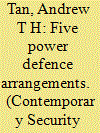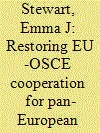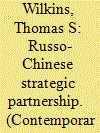|
|
|
Sort Order |
|
|
|
Items / Page
|
|
|
|
|
|
|
| Srl | Item |
| 1 |
ID:
083627


|
|
|
|
|
| Publication |
2008.
|
| Summary/Abstract |
From tentative beginnings in 1971, the Five Power Defence Arrangements (FPDA), which groups Britain, Australia, New Zealand, Malaysia, and Singapore have developed into a credible military cooperation arrangement with the potential to play a role in regional security, in areas such as maritime security, counter-terrorism, and disaster rescue. The FPDA has other important roles, such as a deterrent to external attack, as a CBM between Malaysia and Singapore, an enabler for Britain, Australia, and New Zealand to remain engaged in a region of importance to them, and networking, which helps to sustain long-standing military relationships dating back to the Malayan Emergency. Despite constraints, the comfortable military working relationship, the flexibility of the Arrangements, the uncertainties of the regional security environment, and the multidimensional nature of security challenges that require a coordinated response, have meant that it has become part of the post-Cold War and post-11 September regional security architecture
|
|
|
|
|
|
|
|
|
|
|
|
|
|
|
|
| 2 |
ID:
083630


|
|
|
|
|
| Publication |
2008.
|
| Summary/Abstract |
Two separate strands of political science literature have reinvigorated the study of culture in international security in recent years through their methodological rigor and empiric accuracy: constructivism and organizational theory. It is important to recognize, though, that these literatures speak to particular roles of culture in strategic studies - and not those roles studied in the strategic culture literature. Indeed, that literature has not been as successful as the other two, suffering from over-determined predictions, empirical failures, and an unresolved debate about epistemology. Thus, there is a perplexing lacuna in the centre of this field: a weak core of cultural analysis in international security coupled with stronger works at the periphery. There are two reasons for this. One the one hand, organizational cultures tend to be more unified than the myriad strains in all national cultures. On the other, constructivism looks primarily to explain - and less often to predict - identity. Traditional strategic culture work suffers the worst of both worlds, striving for explanatory power but having to grapple with multiple, competing cultures, and so is weaker than either of the other schools. While culturally aware scholarship of specific political institutions and social actors of specific cases should be encouraged, policymakers and scholars should not expect much distinctive predictive utility from the strategic culture literature per se
|
|
|
|
|
|
|
|
|
|
|
|
|
|
|
|
| 3 |
ID:
083626


|
|
|
|
|
| Publication |
2008.
|
| Summary/Abstract |
The European Union (EU) and the Organization for Security and Cooperation in Europe (OSCE) have a long history of cooperation. The agendas of the organizations overlap in the post-Cold War era, particularly in their shared objective of pan-European conflict prevention. Cooperation between the EU and the OSCE has made a significant contribution to European security by preventing conflict and promoting political and economic stability in Southeast Europe. Yet the political crisis of the OSCE is jeopardizing further EU-OSCE cooperation, harming prospects for peace and democracy in the South Caucasus and Central Asia.
This article examines the fate of the OSCE and EU-OSCE cooperation since 1989, and assesses the factors limiting the prospects for cooperation and their mutual achievements in conflict prevention. It concludes that, given the EU's foreign policy objectives, it is in its interest to confront the political deadlock between Russia and the United States within the OSCE, by resuming EU partnership with the OSCE, and by forging a proactive and constructive policy towards the Russian Federation. These efforts could contribute to the revival of pan-European security cooperation, and ensure stability and peace in Europe's wider neighbourhood
|
|
|
|
|
|
|
|
|
|
|
|
|
|
|
|
| 4 |
ID:
083631


|
|
|
|
|
| Publication |
2008.
|
| Summary/Abstract |
Strategic Partnership represents a new mode of state-to-state alignment. Yet our understanding of this phenomenon is obscured by a lack of definitional precision, resulting in a frequent misapplication of the term. This article seeks to rectify this shortcoming and apply some conceptual rigor to the analysis of strategic partnerships in international relations. This is achieved through the employment of a model drawn from the field of organization studies. The model is designed to assist us in better grasping the purpose, properties, and behaviour of strategic partnerships. The Russo-Chinese strategic partnership - the exemplar of this new alignment phenomenon - is analysed as the primary case study, followed by a precursory examination of Moscow's partnerships with Iran and India. The article concludes that, if employed judiciously, the label strategic partnership is substantive and meaningful in security terms, and that many concepts borrowed from organization studies are relevant and applicable to increasing our comprehension of this often-maligned phenomenon of international politics.
|
|
|
|
|
|
|
|
|
|
|
|
|
|
|
|
| 5 |
ID:
083628


|
|
|
|
|
| Publication |
2008.
|
| Summary/Abstract |
The toppling of Saddam Hussein's regime in 2003 has drastically altered the strategic and security landscape in the Persian Gulf and the broader Middle East. This article examines Iranian, Iraqi, and Saudi security perceptions of and policies towards their immediate shared region following the American invasion. It argues that despite other changes, their policies are still driven more by national interests and less by ideological orientations.
The argument is three-fold. First, Iraq is likely to be a passive player in the emerging regional security system with a minimal role in shaping the regional security environment. Instead, developments in Baghdad are likely to be influenced by the cooperation/rivalry between other regional and international powers. Second, ideology remains an important determinant of the Iranian and Saudi foreign policies, but, contrary to much professional speculation, these policies are and will continue to be driven less by ideological orientations and more by realist national interests. Third, in the long run, however, deepening sectarian strife will further destabilize the region and threaten Western interests. Accordingly, the Persian Gulf policies of United States and other global actors should seek above all to contain sectarian division in Iraq and throughout the region. The most promising approach is inclusive, including an understanding between Washington and Tehran, as well as serious efforts to make peace with Israel, to enhance the prospects for regional stability and world peace
|
|
|
|
|
|
|
|
|
|
|
|
|
|
|
|
| 6 |
ID:
083629


|
|
|
|
|
| Publication |
2008.
|
| Summary/Abstract |
The showdown with Iran on the nuclear issue may well be one of the most influential crises in the post-cold war era. Prevailing theories of asymmetrical interdependence, the backbone of orthodox understandings of globalization and post-modern cooperation, foster the expectation that Iran should comply with UN demands and stop its uranium enrichment programme. Why is Iran not backing down on its nuclear aspirations, despite its asymmetrical interdependence? In this article, we draw on the neo-liberal insights of R. Harrison Wagner to argue that contrary to conventional assumptions, asymmetrical interdependence is not enough for predicting bargaining outcomes. Rather, it is essential to ask how much the targeted state values the goods that it is being asked to forgo.
Drawing on this central observation, Iran's non-compliance is much easier to explain, as are the most effective courses of action to deal with it. Iran is non-compliant, despite orthodox neo-liberal assumptions, because it values its nuclear options more than the costs being imposed on it, and likely to be further imposed, from non-compliance. This perspective suggests that policies based on manipulation of asymmetrical economic interdependence are unlikely to succeed. Outside actors must change the paradigm of the past 20 years, taking Iran's high resolve into account. The carrot-or-stick package must find carrots that are lucrative enough, and threats that are credible enough, to convey the high costs of non-compliance and the benefits of cooperation.
|
|
|
|
|
|
|
|
|
|
|
|
|
|
|
|
| 7 |
ID:
083625


|
|
|
|
|
| Publication |
2008.
|
| Summary/Abstract |
After the announcement of the doctrine of preemption in 2002, many observers concluded the George W. Bush administration had abandoned the strategy of deterrence. This is a misconception. This article aims both to clarify the status of deterrence in American strategy since 9/11 and to assess that strategy.
The Bush administration tried simultaneously to make deterrence do both more and less. Specifically, the administration has sought four goals with respect to deterrence: to bolster American credibility; to stretch deterrence to new tasks; to reduce reliance on deterrence; and implement a new approach of 'tailored deterrence'. Although these different impulses appear to be in conflict, within the administration's strategic outlook they made coherent sense. But the Bush administration underestimated the prospects for deterring rogue states and hence overstated the need for preventive action. Indeed, the Bush administration's rhetorical overemphasis on preemption and regime change may have undermined deterrence. Elements of the American response to international terrorism, moreover, were at cross-purposes with the Bush administration's own efforts to use 'deterrence by denial' against terrorism
|
|
|
|
|
|
|
|
|
|
|
|
|
|
|
|
|
|
|
|
|